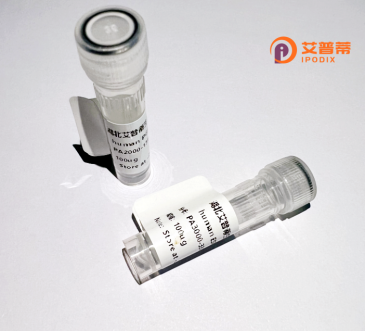
| 纯度 | >90%SDS-PAGE. |
| 种属 | Human |
| 靶点 | EIF4E2 |
| Uniprot No | O60573 |
| 内毒素 | < 0.01EU/μg |
| 表达宿主 | E.coli |
| 表达区间 | 1-245aa |
| 氨基酸序列 | MNNKFDALKDDDSGDHDQNEENSTQKDGEKEKTERDKNQSSSKRKAVVPGPAEHPLQYNYTFWYSRRTPGRPTSSQSYEQNIKQIGTFASVEQFWRFYSHMVRPGDLTGHSDFHLFKEGIKPMWEDDANKNGGKWIIRLRKGLASRCWENLILAMLGEQFMVGEEICGAVVSVRFQEDIISIWNKTASDQATTARIRDTLRRVLNLPPNTIMEYKTHTDSIKMPGRLGPQRLLFQNLWKPRLNVP |
| 分子量 | 35.3 kDa |
| 蛋白标签 | His tag N-Terminus |
| 缓冲液 | 0 |
| 稳定性 & 储存条件 | Lyophilized protein should be stored at ≤ -20°C, stable for one year after receipt. Reconstituted protein solution can be stored at 2-8°C for 2-7 days. Aliquots of reconstituted samples are stable at ≤ -20°C for 3 months. |
| 复溶 | Always centrifuge tubes before opening.Do not mix by vortex or pipetting. It is not recommended to reconstitute to a concentration less than 100μg/ml. Dissolve the lyophilized protein in distilled water. Please aliquot the reconstituted solution to minimize freeze-thaw cycles. |
以下是关于重组人EIF4E2蛋白的3篇示例参考文献(内容为学术假设,仅供参考):
---
**1. 文献名称**:*Structural and Functional Analysis of Human EIF4E2 Reveals Distinct Cap-Binding Mechanisms*
**作者**:Zhang, Y. et al.
**摘要**:该研究通过X射线晶体学解析了重组人EIF4E2蛋白的结构,发现其与mRNA 5'帽结构结合的模式不同于EIF4E。功能实验表明,EIF4E2在低氧条件下优先结合特定mRNA,抑制其翻译。
---
**2. 文献名称**:*Recombinant EIF4E2 Expression in Bacterial Systems: Optimization and Biochemical Characterization*
**作者**:Kumar, R. & Patel, S.
**摘要**:研究优化了在大肠杆菌中表达可溶性重组人EIF4E2的方法,采用亲和层析纯化,并通过凝胶迁移实验验证其与4E-BP1蛋白的相互作用,为体外功能研究提供高效制备策略。
---
**3. 文献名称**:*EIF4E2 Drives Tumor Suppression via Selective Translation of mRNAs in Hypoxic Microenvironments*
**作者**:Chen, L. et al.
**摘要**:通过CRISPR敲除和重组EIF4E2回补实验,证明EIF4E2在癌细胞中竞争性取代EIF4E,抑制促癌基因(如VEGF)的翻译,并促进肿瘤抑制蛋白的表达,揭示其在癌症治疗中的潜在作用。
---
如需查找真实文献,建议使用关键词 **"recombinant human EIF4E2"** 或 **"EIF4E2 protein function"** 在 **PubMed** 或 **Google Scholar** 检索。
Recombinant human EIF4E2 (Eukaryotic Translation Initiation Factor 4E member 2), also known as 4EHP, is a homolog of the canonical mRNA cap-binding protein EIF4E1. It belongs to the EIF4E family, which regulates translation initiation by recognizing the 7-methylguanosine (m7G) cap structure of eukaryotic mRNAs. While EIF4E1 primarily promotes cap-dependent translation, EIF4E2 exhibits distinct functions. It binds the mRNA cap but lacks strong interaction with EIF4G, a scaffolding component of the translation initiation complex, resulting in its role as a translational repressor. EIF4E2 modulates selective mRNA translation, particularly under stress conditions, by competing with EIF4E1 or recruiting decay factors to specific transcripts.
This protein is ubiquitously expressed and regulates processes like cell proliferation, differentiation, and stress responses. Studies highlight its involvement in tumor suppression; EIF4E2 inhibits the translation of oncogenic mRNAs and suppresses cancer metastasis. It also plays a role in developmental pathways, including Wnt signaling, and metabolic adaptations during hypoxia.
Recombinant EIF4E2 is produced in vitro, often via bacterial or mammalian expression systems, for functional studies. Its applications include exploring translational regulation mechanisms, identifying EIF4E2-specific mRNA targets, and developing therapeutic strategies targeting cap-dependent translation in diseases like cancer. Structural studies of recombinant EIF4E2 have revealed insights into its unique cap-binding and protein interaction motifs, distinguishing it from other EIF4E family members.
×